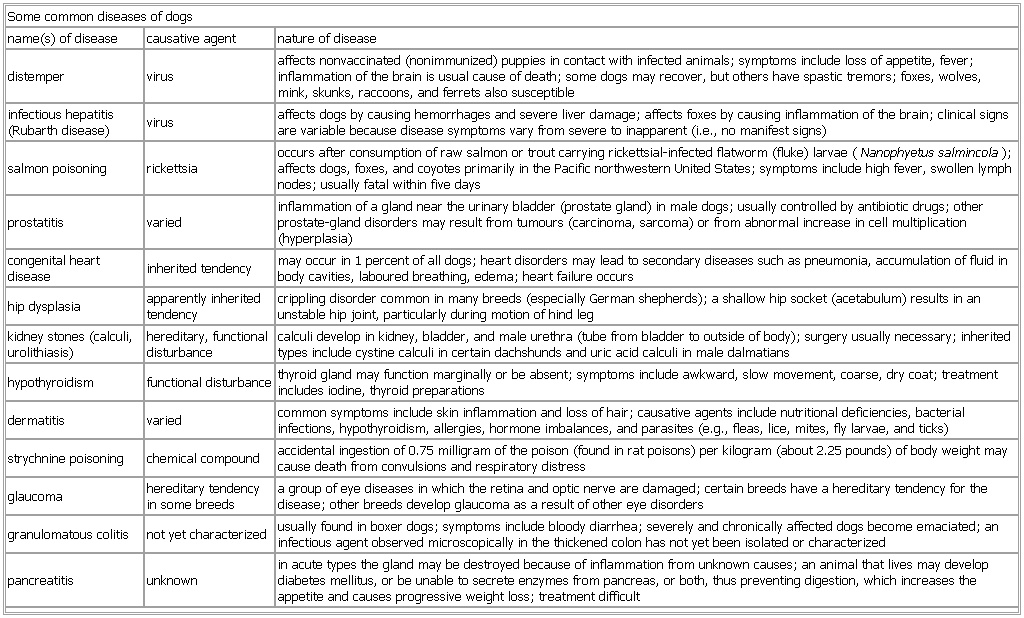- Some common diseases of dogs
-
▪ TableSome common diseases of dogsname(s) of disease causative agent nature of diseasedistemper virus affects nonvaccinated (nonimmunized) puppies in contact with infected animals; symptoms include loss of appetite, fever; inflammation of the brain is usual cause of death; some dogs may recover, but others have spastic tremors; foxes, wolves, mink, skunks, raccoons, and ferrets also susceptibleinfectious hepatitis (Rubarth disease) virus affects dogs by causing hemorrhages and severe liver damage; affects foxes by causing inflammation of the brain; clinical signs are variable because disease symptoms vary from severe to inapparent (i.e., no manifest signs)salmon poisoning rickettsia occurs after consumption of raw salmon or trout carrying rickettsial-infected flatworm (fluke) larvae (Nanophyetus salmincola); affects dogs, foxes, and coyotes primarily in the Pacific northwestern United States; symptoms include high fever, swollen lymph nodes; usually fatal within five daysprostatitis varied inflammation of a gland near the urinary bladder (prostate gland) in male dogs; usually controlled by antibiotic drugs; other prostate-gland disorders may result from tumours (carcinoma, sarcoma) or from abnormal increase in cell multiplication (hyperplasia)congenital heart disease inherited tendency may occur in 1 percent of all dogs; heart disorders may lead to secondary diseases such as pneumonia, accumulation of fluid in body cavities, laboured breathing, edema; heart failure occurship dysplasia apparently inherited tendency crippling disorder common in many breeds (especially German shepherds); a shallow hip socket (acetabulum) results in an unstable hip joint, particularly during motion of hind legkidney stones (calculi, urolithiasis) hereditary, functional disturbance calculi develop in kidney, bladder, and male urethra (tube from bladder to outside of body); surgery usually necessary; inherited types include cystine calculi in certain dachshunds and uric acid calculi in male dalmatianshypothyroidism functional disturbance thyroid gland may function marginally or be absent; symptoms include awkward, slow movement, coarse, dry coat; treatment includes iodine, thyroid preparationsdermatitis varied common symptoms include skin inflammation and loss of hair; causative agents include nutritional deficiencies, bacterial infections, hypothyroidism, allergies, hormone imbalances, and parasites (e.g., fleas, lice, mites, fly larvae, and ticks)strychnine poisoning chemical compound accidental ingestion of 0.75 milligram of the poison (found in rat poisons) per kilogram (about 2.25 pounds) of body weight may cause death from convulsions and respiratory distressglaucoma hereditary tendency in some breeds a group of eye diseases in which the retina and optic nerve are damaged; certain breeds have a hereditary tendency for the disease; other breeds develop glaucoma as a result of other eye disordersgranulomatous colitis not yet characterized usually found in boxer dogs; symptoms include bloody diarrhea; severely and chronically affected dogs become emaciated; an infectious agent observed microscopically in the thickened colon has not yet been isolated or characterizedpancreatitis unknown in acute types the gland may be destroyed because of inflammation from unknown causes; an animal that lives may develop diabetes mellitus, or be unable to secrete enzymes from pancreas, or both, thus preventing digestion, which increases the appetite and causes progressive weight loss; treatment difficultSee as table:

* * *
Universalium. 2010.
